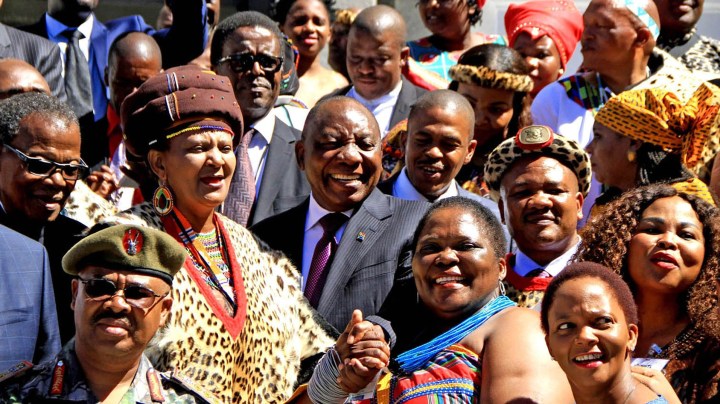RURAL LAW & LEGISLATION
Activists decry ‘unconstitutional’ passing of Traditional Courts Bill, plead with Ramaphosa not to sign

Rural land activists, who form part of the Stop the Bantustan Bills campaign, are urging president Cyril Ramapahosa not to sign the current version of the Traditional Courts Bill into law. Parliament passed the bill on 8 September.
In a statement issued this week, the activists say the Traditional Courts Bill (TCB) is unconstitutional because it “does not include the opt-out clause that stakeholders fought for since 2008. The provision would allow a party before a traditional court to ‘opt out’ of its jurisdiction in favour of another forum or court, thereby giving the party the option to choose. Its exclusion is an affront to rural people who have consistently demanded that their constitutional and customary rights be protected”.
The statement also points out that opposition parties – the Economic Freedom Fighters, Democratic Alliance, Freedom Front and African Christian Democratic Party – also oppose the bill. The TCB has long been a contentious bill dating back as far as 2008, when it was referred back to Parliament to address, and again in 2012 because it “discriminated against women, allowed for demeaning forms of punishment, and subjected people living in the former Bantustans to a separate legal system”.
The activists’ statement also says that:
“The NA’s passing of the TCB on 8 September 2022 mocks the tireless efforts and submissions made by rural citizens to Parliament to safeguard their democratic rights. For over a decade, rural people have made it clear to Parliament they will be locked into the jurisdiction of a traditional leader and a traditional court without any choice if the bill failed to include an explicit opt-out provision. Some of these traditional leaders are not recognised by rural communities as they were imposed over them during apartheid.”
National Coordinator of the Alliance for Rural Democracy, Constance Mogale, told Maverick Citizen she did not think Parliament took into account their submissions and warning of the impact that passing the bill in its current form would have on the lives of rural people:
“In our submissions to Parliament, we explicitly told them that any law dealing with traditional courts shouldn’t be about traditional leadership but should be regulated through customary law. In 2014, the Alliance for Rural Democracy (ARD), the Rural Women’s movement of KwaZulu-Natal as well as the Land Access Movement of South Africa met with the Deputy Minister John Jeffery through the coordination of Land and Accountability Research Centre (Larc) and gave them a few bottom lines as a precondition to accepting this bill. These include:
- Any new version of the TCB cannot rely on the same Bantustan boundaries entrenched by the Traditional Leadership and Governance Framework Act. These boundaries enclose the poorest and historically disadvantaged people in South Africa. Customary law as recognised in the Constitution must apply and be recognised fully throughout the country, without geographic restrictions.
- People must not be locked into the jurisdiction of these forums. People must be able to opt in and out of customary dispute resolution forums based on their personal recognition of such forums.
- Any legislation about customary dispute resolution forums must include substantive protections for women, children and other vulnerable groups, such as LGBTQI people. The ability of these vulnerable peoples to speak and be heard in these forums without fear of repercussions must be safeguarded,” said Mogale.
Visit Daily Maverick’s home page for more news, analysis and investigations
Forced traditional compliance
Speaking to Maverick Citizen, Larc director Nolundi Luwaya said, “There are many traditional leaders that were imposed on communities during the apartheid period and the authority of these leaders remains contested presently. Inclusion of the opt-out clause in the bill that was introduced in 2017 was in consideration of this reality, among other factors. Without the opt-out clause, traditional leaders whose legitimacy is contested by members of the community, will have the power to force those members to appear in his or her court and they will not have a choice but to comply. There are already cases of this kind of abuse by some traditional leaders.”
______________________________
Visit Daily Maverick’s home page for more news, analysis and investigations
______________________________
Luwaya said that Larc was aware of a case where a traditional leader had used a private army to assault, kidnap and hold at his place community members that contested his legitimacy and authority.
Noting how the TCB prejudices women, Luwaya explained that “While the bill correctly states that women can be members and parties in traditional courts, the reality is patriarchy remains a big challenge in rural areas. Many women in areas such as rural KZN still get chased out of the marital homes after the husband has died. Many women, particularly widows, are still not able to represent themselves in traditional courts and often have to be represented by a male relative.”
Mogale said the campaign is not in opposition of traditional courts, however they “must be built on the practice, experience, and knowledge of ordinary people. The promotion of customary law through education in this way should be extended to government officials, judges, and existing legal practitioners throughout the legal system”.
Asked what the campaign’s next steps would be if the president didn’t heed their call not to sign the bill, both Luwaya and Mogale answered that the campaign would fight against its passing – either through the courts and/or the mobilisation of people on the ground. DM/MC



















 Become an Insider
Become an Insider
Any duality in the legal system is bound to lead to problems. The time for executive authority being wielded by traditional leaders is long past. They must be satisfied with ceremonial roles.
It should be very long past, but Africans like living in the past. There is no tomorrow for them. Blame today on yesterday and do nothing to prepare for making tomorrow a better day.